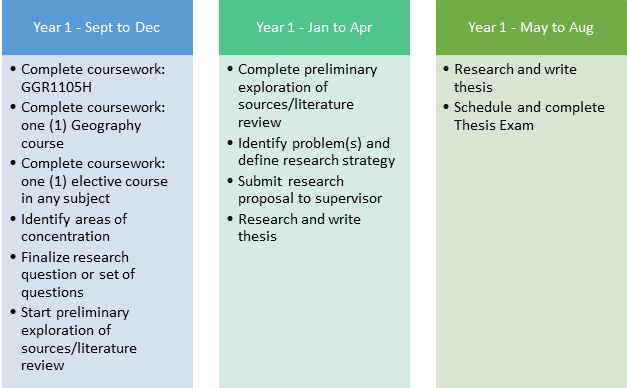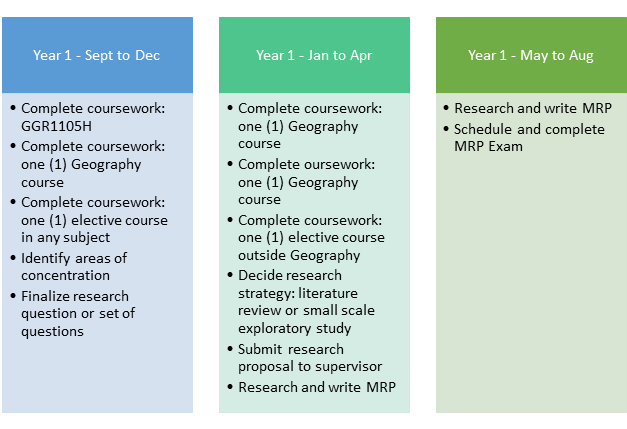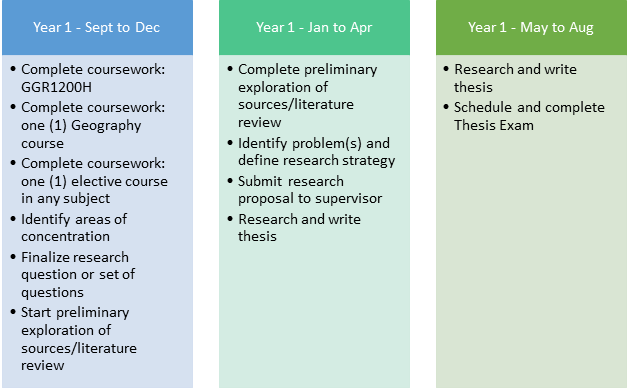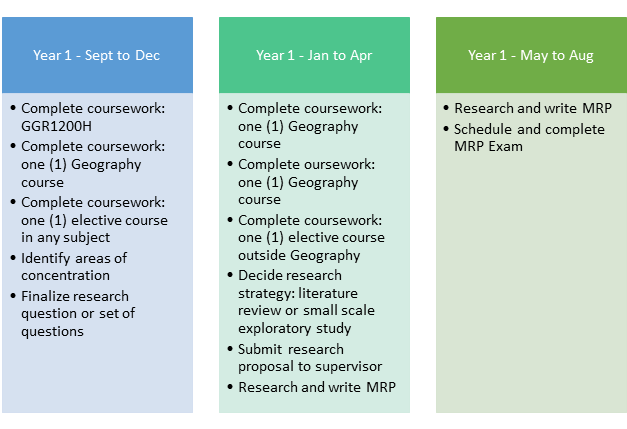MA programs are usually focused on fields of human geography such as Urban, Economic, Historical, Social, or Cultural Geography. All MA students must complete the Human Geography Core Course (GGR1105H).
Progress into the second session is dependent on achieving an overall B average in the first session and maintaining satisfactory progress as outlined in the SGS Calendar General Regulations. The department may recommend termination of a student’s registration if they have failed to maintain satisfactory progress.
The thesis option is recommended for students who have a strong background in geography and who want to complete a significant research initiative. Students choosing this option should have a clear idea of the topic they would like to research. A thesis is encouraged for students who are planning on pursuing a PhD or jobs that require significant research experience. Students enrolled in a Master’s Thesis Option are required to complete the requirements: coursework, research proposal, and thesis defense exam.
Program Requirements
Master’s degree programs usually take one to two calendar years to complete; the average time to completion as of 2023 is 2 years. The School of Graduate Studies requires that the thesis be submitted within three years of initial registration in the program; however, extensions beyond three years can be requested.
All coursework should be completed within eight (8) months of initial registration. Time taken to complete the research and writing of the thesis varies depending on numerous factors, including whether the research requires ethics approval, conducting interviews or gaining permission to access archival materials, and whether the research involves extensive fieldwork or lengthy experiments. The timeline below is a guide for completing within the one (1) year that the program is funded.

Students can register in a second year as necessary to continue research and writing activities.
Students who register in a second year and beyond are required to meet with their supervisor by the end of September to review their activities over the summer and set out a timeline for the year. An Annual Report form must be completed at this meeting and submitted to the graduate office through the Master’s Annual Report Online Submission tool.
Students are required to complete 3 half-credit courses (or 1.5 FCEs), including:
- the 0.5 FCE core course (GGR1105H)
- one (1) half-credit (0.5 FCE) course in geography or from an approved list
- one (1) half-credit (0.5 FCE) course in any subject
Students enrolled in a collaborative specialization should view the Collaborative Specializations page for any additional requirements.
Students should submit a research proposal to their supervisor by March 1 of their first year. The proposal should be 2500 to 4000 words and include the following:
- Outline of the topic/research question;
- Literature review;
- Methodology
- Timeline for completion of research/data collection, writing and final defense of the thesis or major research paper
Students are required to complete a thesis (RST9999Y) which must be presented and defended at an oral examination. The thesis is generally not more than 26,000 words (typically up to 80 pages double-spaced), not including appendices and bibliography.
The thesis project will address a research question or set of questions. It involves the analysis and interpretation of data and outputs would include the thesis, but could also involve videos, policy reports and other forms of dissemination. A thesis may involve the use of data collected by the student or supervisor, including for example, interviews, ethnographic observations or survey data. Students may also be involved in the analysis of other forms of data, such as census data, archival materials, popular media reports, images or policy documents. The thesis should include an introduction, a statement of research question(s) or problem, a literature review, a methodology section, and discussion of findings. The thesis should be seen as the basis of one or more publishable papers.
The thesis will be defended at an oral exam attended by the supervisor(s) and two additional faculty members, one of which must be from geography. The student must submit an exam request form with the exam details a minimum of 2 weeks prior to the examination date. The graduate office will prepare an examination file that can be collected by the supervisor just before the exam, to be returned immediately following the exam.
The thesis must be formatted using the SGS formatting guidelines, and must be approved by the supervisor(s) prior to distribution to the examiners. The complete thesis (including all references, appendices, etc.) must be provided to the all examiners and the graduate office a minimum of 2 weeks prior to the exam date (or earlier, up to 4 weeks prior, at the discretion of the exam committee). If the thesis is not received 2 weeks prior to the exam, the graduate office will cancel the exam. The graduate office will prepare the examination file that can be collected by the supervisor just before the exam to be returned immediately following the exam.
The exam must be scheduled for 2 hours and the student must attend the exam on campus. The student may give a short presentation of about 15 minutes summarizing the major contributions of the thesis. This presentation will be followed by questions from the committee members. At the end of the examination, the student will leave the room while the committee reaches a decision. The committee will recommend (or not) that the thesis be accepted and may require revisions prior to submission to the department and the School of Graduate Studies.
Once any final revisions or modifications have been made and confirmed in writing by the supervisor(s), the final thesis must be submitted electronically to SGS and to the department. See the SGS guidelines on Producing Your Thesis for further information.
Refer to the Examinations page for further information.
MA programs are usually focused on fields of human geography such as Urban, Economic, Historical, Social, or Cultural Geography. All MA students must complete the Human Geography Core Course (GGR1105H).
Progress into the second session is dependent on achieving an overall B average in the first session and maintaining satisfactory progress as outlined in the SGS Calendar General Regulations. The department may recommend termination of a student’s registration if they have failed to maintain satisfactory progress.
The major research paper (MRP) is recommended for students who would like to place more emphasis on coursework, for example, in the case of students who have not taken many courses in geography at the undergraduate level. An MRP may be an option for students who plan to work professionally in their field rather than pursue a PhD. Students enrolled in a Master’s MRP Option are required to complete the requirements: coursework, research proposal, and major research paper presentation.
Program Requirements
Master’s degree programs usually take one to two calendar years to complete; the average time to completion as of 2023 is 2 years. The School of Graduate Studies requires that the MRP be submitted within three years of initial registration in the program; however, extensions beyond three years can be requested.
All coursework should be completed within eight (8) months of initial registration. Time taken to complete the research and writing of the thesis varies depending on numerous factors, including whether the research requires ethics approval, conducting interviews or gaining permission to access archival materials, and whether the research involves extensive fieldwork or lengthy experiments. The timeline below is a guide for completing within the one (1) year that the program is funded.

Students can register in a second year as necessary to continue research and writing activities.
Students who register in a second year and beyond are required to meet with their supervisor by the end of September to review their activities over the summer and set out a timeline for the year. An Annual Report form must be completed at this meeting and submitted to the graduate office through the Master’s Annual Report Online Submission tool.
Students are required to complete 6 half-credit courses (or 3.0 FCEs), including:
- the 0.5 FCE core course (GGR1105H for MA)
- three (3) half-credit (0.5 FCE) courses in geography or from an approved list
- one (1) half-credit (0.5 FCE) course which must be taken outside the department
- one (1) half-credit (0.5 FCE) course in any subject
Students enrolled in a collaborative specialization should view the Collaborative Specializations page for any additional requirements.
Students should submit a research proposal to their supervisor by March 1 of their first year. The proposal should be 2500 to 4000 words and include the following:
- Outline of the topic/research question;
- Literature review;
- Methodology
- Timeline for completion of research/data collection, writing and final defense of the thesis or major research paper
The MRP is generally not more than 13,000 words (typically up to 40 pages double-spaced), not including appendices and bibliography. The MRP will address a research question or set of questions and can take different forms, including:
- A literature review that offers summary, synthesis and critique and draws conclusions without the collection and use of primary data;
- A small scale or exploratory study that is similar to the thesis, except that it is smaller in scope. As with a thesis, this could involve use of data collected by the student or supervisor (such as interview or ethnographic data). Students may also be involved in the analysis of other forms of data, such as census data, archival materials, popular media reports, images or policy documents. The project will involve the analysis and interpretation of data and outputs would include the major research paper, but in addition could include videos, policy reports and other forms of dissemination.
The MRP will be read by the supervisor(s) and a second reader who is a faculty member from geography and will be discussed at an MRP meeting. The student must submit an exam request form with the meeting details a minimum of 2 weeks prior to the examination date. The graduate office will prepare an examination file that can be collected by the supervisor just before the exam, to be returned immediately following the exam.
The MRP should be formatted using the SGS formatting guidelines for theses, and must be approved by the supervisor(s) prior to distribution to the examiners. The MRP must be provided to the supervisor(s) and second reader a minimum of 2 weeks prior to a scheduled meeting (or earlier, up to 4 weeks prior, at the discretion of the readers). If the MRP is not received, the graduate office will cancel the meeting. At the meeting of the supervisor(s), second reader and student, the student will be given the opportunity to present the work (15 minutes maximum) and to discuss the strengths and weaknesses of the draft paper. The total meeting time will be up to one hour. The supervisor(s) and second reader will then jointly identify any revisions required.
Once any final revisions or modifications have been made and confirmed in writing by the supervisor(s), an electronic copy of the final research paper must be submitted to the department.
Refer to the Examinations page for further information.
MSc programs are usually focused on fields of physical geography, spatial information systems or some areas of environmental studies. All MSc students must complete the Physical Geography Core Course (GGR1200H).
Progress into the second session is dependent on achieving an overall B average in the first session and maintaining satisfactory progress as outlined in the SGS Calendar General Regulations. The department may recommend termination of a student’s registration if they have failed to maintain satisfactory progress.
The thesis option is recommended for students who have a strong background in geography and who want to complete a significant research initiative. Students choosing this option should have a clear idea of the topic they would like to research. A thesis is encouraged for students who are planning on pursuing a PhD or jobs that require significant research experience. Students enrolled in a Master’s Thesis Option are required to complete the requirements: coursework, research proposal, and thesis defense exam.
Program Requirements
Master’s degree programs usually take one to two calendar years to complete; the average time to completion as of 2023 is 2 years. The School of Graduate Studies requires that the thesis be submitted within three years of initial registration in the program; however, extensions beyond three years can be requested.
All coursework should be completed within eight (8) months of initial registration. Time taken to complete the research and writing of the thesis varies depending on numerous factors, including whether the research requires ethics approval, conducting interviews or gaining permission to access archival materials, and whether the research involves extensive fieldwork or lengthy experiments. The timeline below is a guide for completing within the one (1) year that the program is funded.

Students can register in a second year as necessary to continue research and writing activities.
Students who register in a second year and beyond are required to meet with their supervisor by the end of September to review their activities over the summer and set out a timeline for the year. An Annual Report form must be completed at this meeting and submitted to the graduate office through the Master’s Annual Report Online Submission tool.
Students are required to complete 3 half-credit courses (or 1.5 FCEs), including:
- the 0.5 FCE core course (GGR1200H)
- one (1) half-credit (0.5 FCE) course in geography or from an approved list
- one (1) half-credit (0.5 FCE) course in any subject
Students enrolled in a collaborative specialization should view the Collaborative Specializations page for any additional requirements.
Students should submit a research proposal to their supervisor by March 1 of their first year. The proposal should be 2500 to 4000 words and include the following:
- Outline of the topic/research question;
- Literature review;
- Methodology
- Timeline for completion of research/data collection, writing and final defense of the thesis or major research paper
Students are required to complete a thesis (RST9999Y) which must be presented and defended at an oral examination. The thesis is generally not more than 26,000 words (typically up to 80 pages double-spaced), not including appendices and bibliography.
The thesis project will address a research question or set of questions. A thesis involves the collection or use, analysis and interpretation of data or theoretical research. The format of the thesis is to be determined in consultation between the student and supervisor. The MSc thesis must include a literature review followed by sections with an introduction, methodology, results, discussion and conclusion. Results and discussion sections may be merged where appropriate. The completed thesis should be seen as the basis of at least one publishable paper. Where a student and supervisor determine that more than one publishable paper could emerge from the MSc research, individual chapters with separate introduction, methodology, results/discussion and conclusion sections could be used.
The thesis will be defended at an oral exam attended by the supervisor(s) and two additional faculty members, one of which must be from geography. The student must submit an exam request form with the exam details a minimum of 2 weeks prior to the examination date. The graduate office will prepare an examination file that can be collected by the supervisor just before the exam, to be returned immediately following the exam.
The thesis must be formatted using the SGS formatting guidelines, and must be approved by the supervisor(s) prior to distribution to the examiners. The complete thesis (including all references, appendices, etc.) must be provided to the all examiners and the graduate office a minimum of 2 weeks prior to the exam date (or earlier, up to 4 weeks prior, at the discretion of the exam committee). If the thesis is not received 2 weeks prior to the exam, the graduate office will cancel the exam. The graduate office will prepare the examination file that can be collected by the supervisor just before the exam to be returned immediately following the exam.
The exam must be scheduled for 2 hours and the student must attend the exam on campus. The student may give a short presentation of about 15 minutes summarizing the major contributions of the thesis. This presentation will be followed by questions from the committee members. At the end of the examination, the student will leave the room while the committee reaches a decision. The committee will recommend (or not) that the thesis be accepted and may require revisions prior to submission to the department and the School of Graduate Studies.
Once any final revisions or modifications have been made and confirmed in writing by the supervisor(s), the final thesis must be submitted electronically to SGS and to the department. See the SGS guidelines on Producing Your Thesis for further information.
Refer to the Examinations page for further information.
MSc programs are usually focused on fields of physical geography, spatial information systems or some areas of environmental studies. All MSc students must complete the Physical Geography Core Course (GGR1200H).
Progress into the second session is dependent on achieving an overall B average in the first session and maintaining satisfactory progress as outlined in the SGS Calendar General Regulations. The department may recommend termination of a student’s registration if they have failed to maintain satisfactory progress.
The major research paper (MRP) is recommended for students who would like to place more emphasis on coursework, for example, in the case of students who have not taken many courses in geography at the undergraduate level. An MRP may be an option for students who plan to work professionally in their field rather than pursue a PhD. Students enrolled in a Master’s MRP Option are required to complete the requirements: coursework, research proposal, and major research paper presentation.
Program Requirements
Master’s degree programs usually take one to two calendar years to complete; the average time to completion as of 2021 is 2 years. The School of Graduate Studies requires that the MRP be submitted within three years of initial registration in the program; however, extensions beyond three years can be requested.
All coursework should be completed within eight (8) months of initial registration. Time taken to complete the research and writing of the thesis varies depending on numerous factors, including whether the research requires ethics approval, conducting interviews or gaining permission to access archival materials, and whether the research involves extensive fieldwork or lengthy experiments. The timeline below is a guide for completing within the one (1) year that the program is funded.

Students can register in a second year as necessary to continue research and writing activities.
Students who register in a second year and beyond are required to meet with their supervisor by the end of September to review their activities over the summer and set out a timeline for the year. An Annual Report form must be completed at this meeting and submitted to the graduate office through the Master’s Annual Report Online Submission tool.
Students are required to complete 6 half-credit courses (or 3.0 FCEs), including:
- the 0.5 FCE core course (GGR1105H for MA)
- three (3) half-credit (0.5 FCE) courses in geography or from an approved list
- one (1) half-credit (0.5 FCE) course which must be taken outside the department
- one (1) half-credit (0.5 FCE) course in any subject
Students enrolled in a collaborative specialization should view the Collaborative Specializations page for any additional requirements.
Students should submit a research proposal to their supervisor by March 1 of their first year. The proposal should be 2500 to 4000 words and include the following:
- Outline of the topic/research question;
- Literature review;
- Methodology
- Timeline for completion of research/data collection, writing and final defense of the thesis or major research paper
MSc students do not commonly do the MRP option; the majority of students complete a thesis. If a student wanted to pursue the MRP option, students are expected to establish expectations and work out the format with their supervisor. The structure is explained below.
The MRP is generally not more than 13,000 words (typically up to 40 pages double-spaced), not including appendices and bibliography. The MRP will address a research question or set of questions and can take different forms, including:
- A literature review that offers summary, synthesis and critique and draws conclusions without the collection and use of primary data;
- A small scale or exploratory study that is similar to the thesis, except that it is smaller in scope. As with a thesis, this could involve use of data collected by the student or supervisor (such as interview or ethnographic data). Students may also be involved in the analysis of other forms of data, such as census data, archival materials, popular media reports, images or policy documents. The project will involve the analysis and interpretation of data and outputs would include the major research paper, but in addition could include videos, policy reports and other forms of dissemination.
The MRP will be read by the supervisor(s) and a second reader who is a faculty member from geography and will be discussed at an MRP meeting. The student must submit an exam request form with the meeting details a minimum of 2 weeks prior to the examination date. The graduate office will prepare an examination file that can be collected by the supervisor just before the exam, to be returned immediately following the exam.
The MRP should be formatted using the SGS formatting guidelines for theses, and must be approved by the supervisor(s) prior to distribution to the examiners. The MRP must be provided to the supervisor(s) and second reader a minimum of 2 weeks prior to a scheduled meeting (or earlier, up to 4 weeks prior, at the discretion of the readers). If the MRP is not received, the graduate office will cancel the meeting. At the meeting of the supervisor(s), second reader and student, the student will be given the opportunity to present the work (15 minutes maximum) and to discuss the strengths and weaknesses of the draft paper. The total meeting time will be up to one hour. The supervisor(s) and second reader will then jointly identify any revisions required.
Once any final revisions or modifications have been made and confirmed in writing by the supervisor(s), an electronic copy of the final research paper must be submitted to the department.
Refer to the Examinations page for further information.


